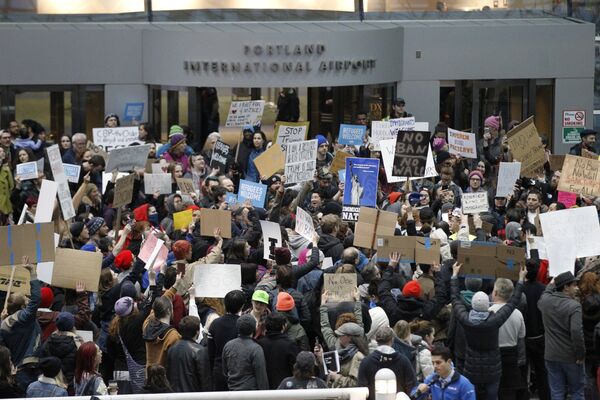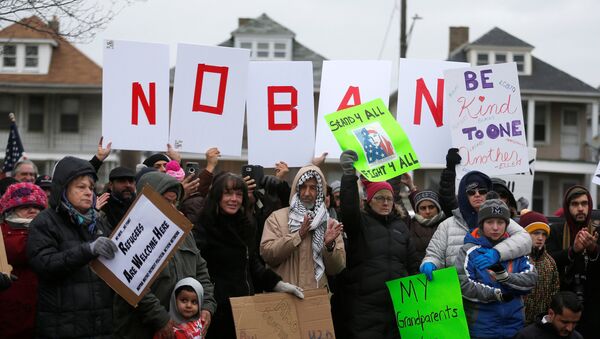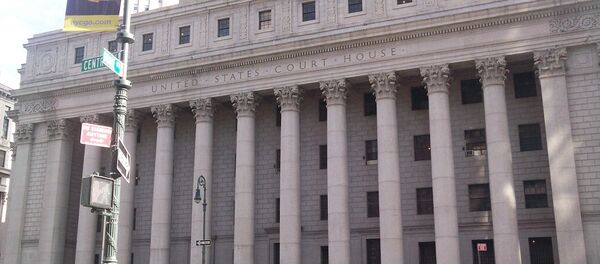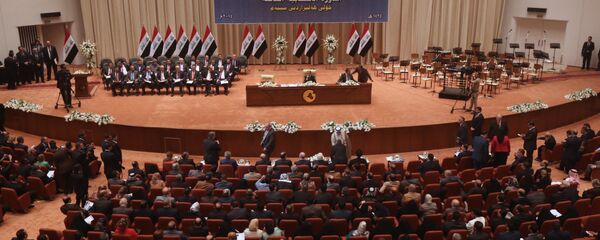On Saturday and Sunday, Trump officials defended the executive order on 'Protecting the Nation From Foreign Terrorist Entry Into the United States', signed by the President on Friday. The law stipulates that people from seven Muslim-majority countries, including Iraq, Syria, Iran, Libya, Sudan, Somalia and Yemen would be barred from entering the United States.
Also on Sunday, hawkish Republican senators John McCain and Lindsey Graham issued a joint statement, condemning the travel ban and suggesting that it would "help terrorist recruitment" and "become a self-inflicted wound in the fight against terrorism."
Trump angrily responded on Twitter, saying that the senators' comments were "wrong" and that they were "sadly weak on immigration." McCain and Graham "should focus their energies on ISIS, illegal immigration and border security instead of always looking to start World War III," the President quipped.
Speaking to Radio Sputnik, Seth Frantzman, a journalist and commentator on Middle East politics at the Jerusalem Post, said that there's been a lot of dishonesty and hypocrisy on all sides in criticizing the Trump travel ban, even if the executive order itself did seem to go too far.
The commentator recalled, for instance, that it was an Obama administration document that served as the basis for Trump's law.
"It seems the order was kind of hastily put together, because you have the question of people with visas and green cards who are now stranded at airports," Frantzman noted. "I think they didn't fully think this through, and they were relying on an old list of 'countries of concern' relating to terrorism that actually existed under the Obama administration. They just basically made it much harsher for people from those countries."
In any case, it was President Obama, the US Congress, and the Obama-era Department of Homeland Security that came up with the list of seven countries, or what they called 'countries of concern', Frantzman said.
In this regard, the journalist suggested that much of the media was being dishonest when it implied that Trump made this list up out of thin air, or worse, deliberately excluded countries based on personal business or other interests.
"They had a kind of ready-made list. The Trump administration has of course put that list on steroids and gone much further. But I think there was a lot of media misinformation the first two days saying that Trump had excluded countries that he has business interests in, etc. There's absolutely no evidence [of] that," Frantzman emphasized.

"The reason Saudi Arabia or Turkey were not on the list – is because Saudi Arabia were not members of this former 'countries of concern' list, and I think this goes back to…how hastily it was put together. The administration, when they signed this executive order, just referenced this old law. They didn't bother to sit down and study this for weeks on end and say 'let's see how this is going to work'."
Asked to comment on John McCain and Lindsey Graham's attack on Trump over the travel ban, including the suggestion that the executive order may lead to "radicalization," Frantzman suggested that "there is a lot of hypocrisy going around. For instance, if you look at the Obama administration, they did try to take in Syrian refugees, but they only took in about 1%, taking in 20-30,000 people a year, when Europe was opening its doors to 800,000 or 500,000."
In fact, he recalled, until 2015, only about 1,800 Syrian refugees were actually accepted into the US, even though the war in Syria had been raging for over four years at that point. "These peoples are victims of ISIS; where was America to help the Yazidis," and perhaps just as importantly, "what is America's role in places like Yemen and Libya?"
"So I think there is kind of hypocrisy [in this idea] that the Trump ban is going to create radicalization, but Obama's drone policy or some of these other policies didn't contribute to that," Frantzman stressed.
"Places like Yemen and Libya are stuck within deep, deep and terrible civil wars. In Iraq, you saw today that the Iraqi parliament did pass [a law] banning Americans flying to Iraq. [So] maybe there is a little bit of blowback, but some of these countries like Yemen and Libya are barely countries [except] name in a sense. There's not much stability in those places, so there's no room for protesting against America, because there are other things going on," the commentator concluded.






